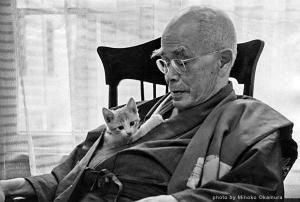
Teitaro Suzuki died on this day, the 12th of July, in 1966. In Western traditions one often marks the date of a remarkable person’s death as a festival.
For the Christian tradition, it’s a new birth into the heavenly realms. I rather like that. Although I think of it more as a celebration of a full life.
He is best known to us as Daisetsu, his dharma name, given to him by his teacher Soen (sometime Soyen) Shaku. Or, most often all of it shortened to, D. T. Suzuki.
D. T. Suzuki was born on the 18th of October, 1870. (The Wikipedia bio mistakenly lists his birthday as a month later)
He was 95 when he died, widely celebrated for his critical part in the migration of Japanese style Zen Buddhism to the West. One could fairly say we in the West use the Japanese term “Zen” rather than “Chan” its name where the school birthed in China because of D. T. Suzuki.
His prolific and in many ways inviting approach to the spiritual tradition with an emphasis on its a-historical qualities and the experience of awakening arrived at a perfect moment. It is not possible to overstate his importance at the foundations of our Western and particularly our English speaking Zen. Giving us the word we use for this spiritual path only begins a very long list.
When Soen Shaku attended the World Parliament of Religions in 1893, the publisher and scholar Paul Carus asked the roshi if he would stay and help him with translating and publishing Zen Buddhist texts into English.
Soen Roshi declined, but recommended his householder student Daisetsu Teitaro Suzuki.
With that Suzuki moved to Illinois and into the Carus household. There he assisted in translating the Dao de Ching, not a Buddhist text, but foundational to understanding East Asian spiritualities. And then they began work on what would become Outlines of Mahayana Buddhism. Also while there Suzuki met, fell in love with, and married Beatrice Erskine Lane.
The couple returned to Japan where Suzuki took up a professorship at Otani University. At that time he also met Shinichi Hisamatsu and became connected, although never formally with the Kyoto School of Buddhist philosophers. Suzuki would teach in Japan and the united States for the rest of his life, and for a number of years later in his career as a visiting professor at Columbia.
D. T. Suzuki, as he was best known, would travel widely, lecturing across North America and Europe. And most importantly, perhaps, he wrote. Eventually, over a hundred books. Much of these efforts focused on Zen.
His circle of influence included the Catholic monk, peace activist and mystic, Thomas Merton, psychologists like Eric Fromm, Karen Horney, and most notably Carl Jung, musicians like John Cage, poets like Gary Snyder and Alan Ginsberg, and, perhaps most importantly Alan Watts. Watts own books on Zen were essentially popularizations of Suzuki’s work. And they were very popular. Through them if washed through Watts’ idiosyncratic, Suzuki’s Zen perspectives reached the general educated English speaking readership like an atomic bomb.
There are many reasons to criticize D. T. Suzuki, some of them deserved. There are serious allegations about Suzuki’s support of Japanese imperialism. Although it should also be noted others say the allegations lack sufficient nuance, and in some situations in fact misrepresent what Suzuki actually said. I am more inclined to this later view. However that could be out of gratitude. It is important to understand there is a shadow hanging over the old teacher.
Also, and I suspect for the long haul, the more problematic issue is his presentation of Zen. He presented a not fully historical, but rather a romanticized version of the Zen dharma. Subsequent scholars and teachers have had to work with, against, and around this. Although in some ways his resonances with Idealism, German and English Romanticism and particularly American Transcendentalism probably made Zen accessible in ways that would otherwise not be so.
All this said in our contemporary categorizations D. T.Suzuki can probably best be categorized as a type of modernist Buddhist.
These criticisms noted, his scholarship was impeccable, and his contributions remain solid. And, to put it baldly, if there were no D. T. Suzuki, Zen in the West even vaguely as we experience it, would not exist.
It is said that D. T. Suzuki’s last words were “Don’t worry. Thank you! Thank you!”
Yes. Thank you! And. Endless bows.












